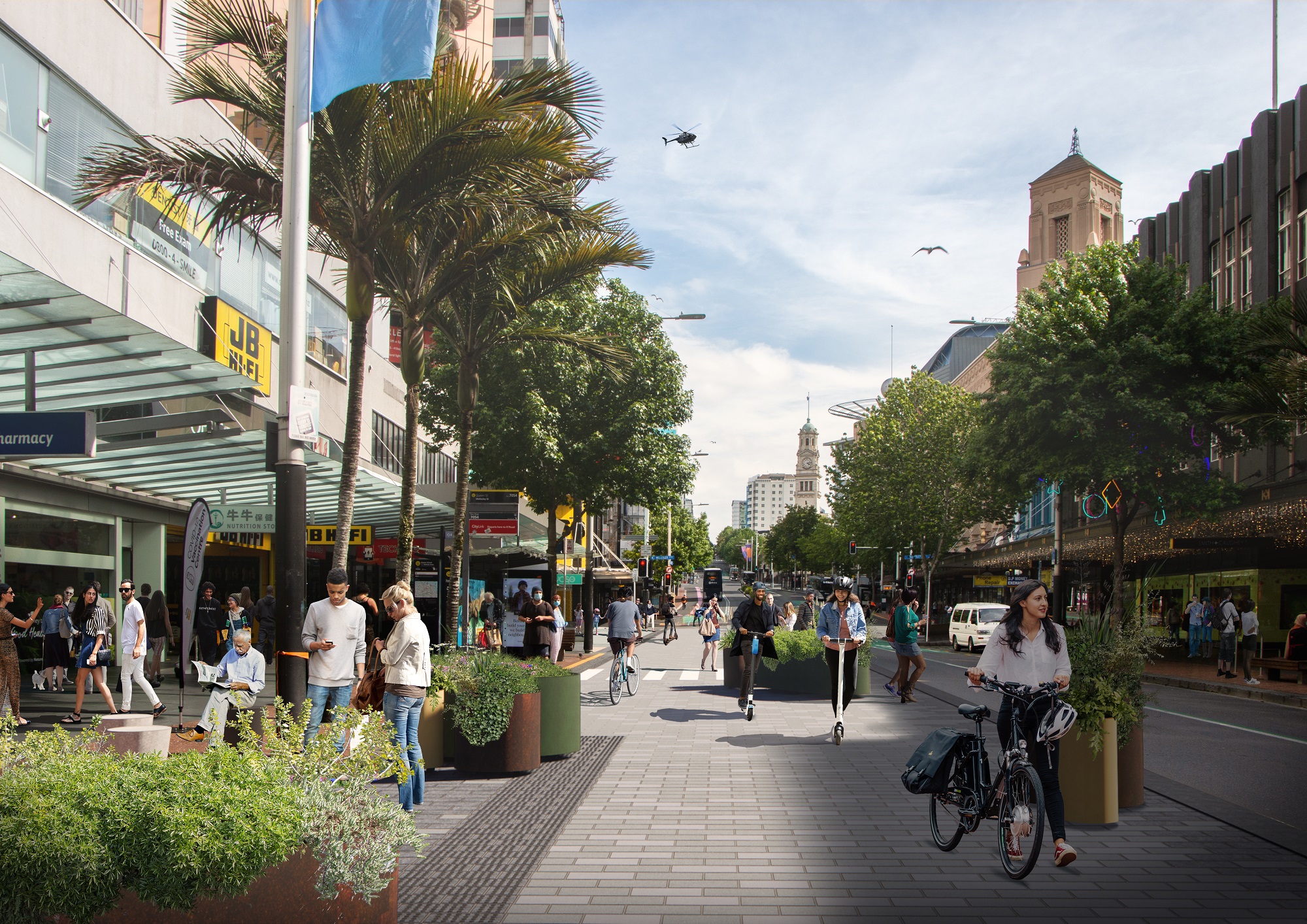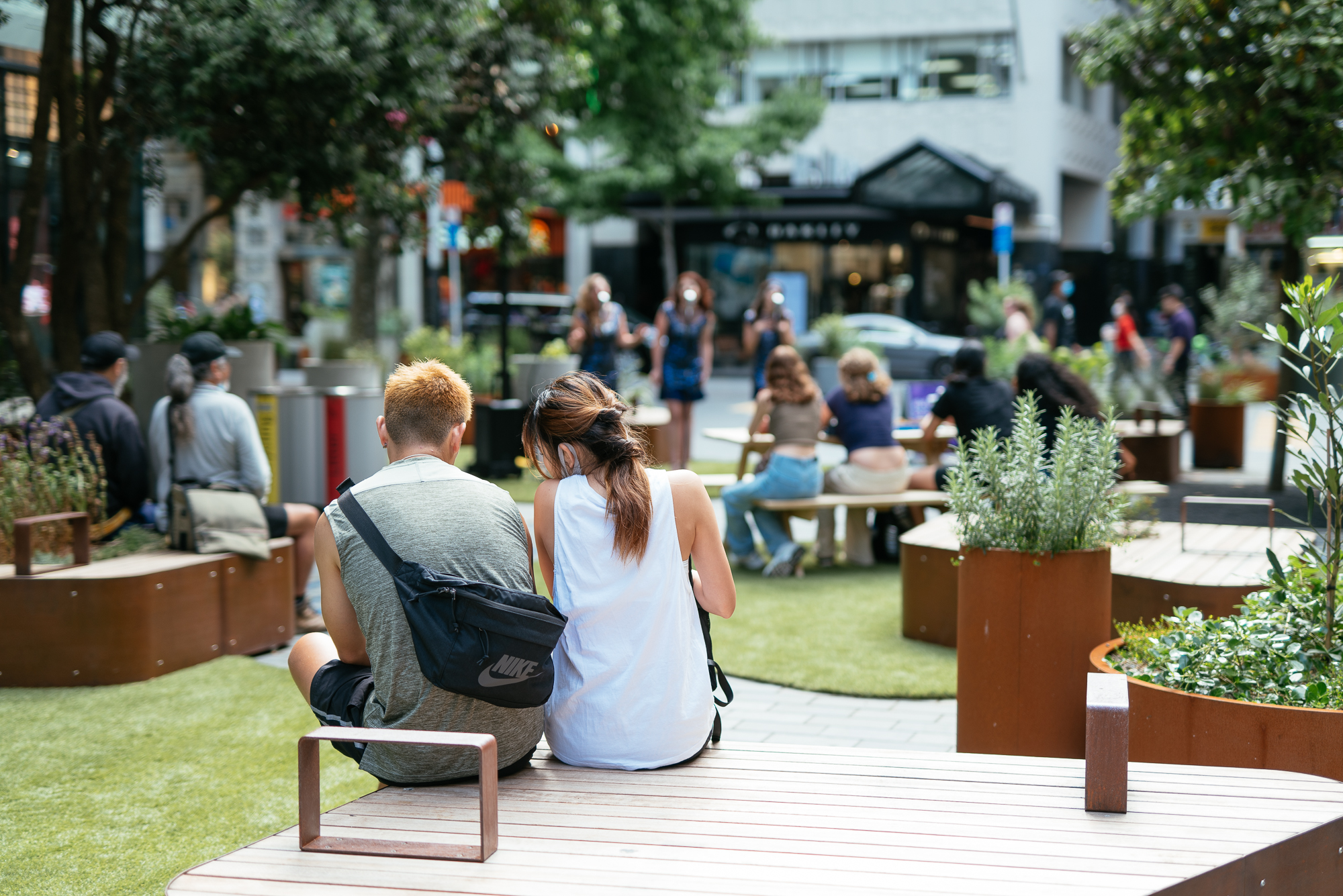Early in September Auckland Council announced the last three stages of the Wai Horotiu Queen Street Project – from Shortland Street to Mayoral Drive – would be delivered in one cohesive design.
Later that month the detail of the design was presented. Aucklanders have now responded, and some refinements have been made. Construction will begin on 10 January 2022.
The later start date was agreed to give Queen Street retailers, hospitality, residents, visitors and shoppers an optimum Christmas and New Year trading period, unimpeded by construction.
The main feature of the design continues to be substantially wider paths, giving people who are walking – and also slower bike and scooter riders - designated spaces to help ensure they co-exist safely.

Mayor Phil Goff says the Queen Street upgrade is the next step in creating a world-class city centre for Auckland.
“COVID-19 has hit our downtown area hard, but we are continuing our project to build a people-friendly city centre that is vibrant, attractive and enjoyable to spend time in,” he says.
“Our upgrade of Auckland’s premier street will extend the successful vision of our waterfront precinct - with its stunning public spaces such as Wynyard Quarter; Te Komititanga, the public square outside Britomart Station; and Te Wānanga, the new harbourfront space - throughout Auckland’s downtown.
“It will help rejuvenate Queen Street, drive the recovery from COVID-19 and create a city centre that will draw people from Auckland, New Zealand and eventually around the world to visit, work, shop, live and enjoy.”
By September 2022, Queen Street will have a distinctly green feel with native foliage filling planters beneath more mature trees. Variation in the shape and materiality of planters will bring both consistency and textural variety to the streetscape.

Chair of the Planning Committee Councillor Chris Darby says: “We’re rolling up our sleeves and getting on with the job of bringing new life to Queen Street.
“The golden mile is about to glow brighter with a design that humanises the street and draws people back to the city.”
Eke Panuku, which is phasing in as the lead agency for the city centre, is pleased to see construction of this section of the project beginning.
“Construction of Wai Horotiu Queen Street Project is another step in delivering outcomes in the City Centre Masterplan,” says Eke Panuku Chief Executive David Rankin.
“This is the next part of realising the wider vision of a vibrant city centre as we turn to recovery following the impacts of COVID-19.”
Auckland Council Director of Infrastructure and Environmental Services, Barry Potter, says: “Refinements to the design have been informed by the local Queen Street community and a detailed peer review. Auckland Council and Auckland Transport would like to thank all Aucklanders who participated in the consultation.
“We are pleased to have been able to give the Queen Street community a clear run-up to Christmas and New Year after a long lockdown, and to announce the final construction timeline for this project. Even though we are starting later, our team has found a way to deliver to the original September 2022 completion date,” he says.
The refinements
The proposed transport changes were largely supported during consultation. These refinements have been made based on feedback from Aucklanders:
- To move towards a people-focused street with no general traffic, there will be no general parking in Queen Street. The street will continue to offer only loading and servicing spaces along the length of the project area with P30 mobility parking around the arts precinct.
- The Essential Vehicles Area (EVA) between Wellesley and Wakefield Streets will be implemented with 24/7 operation. Permitted vehicles will be buses, motorcycles, mopeds, bicycles, goods vehicles and emergency service vehicles. It excludes private vehicles.
- The proposed High St right-turn ban into Victoria St (part of the proposed design) will not proceed. Instead, a wider piece of work will be undertaken on a coordinated set of changes to better direct traffic away from Queen Street and around the city centre as envisaged by the A4E (Access for Everyone) strategy.
Auckland Council has also engaged with experts in accessibility, placemaking and transport, as part of the independent peer review process, and with the local community to help ensure the multi-use path operates smoothly and safely.
Here are some of the features:
- The multi-use path will be extended to end at Aotea Square.
- Design improvements have been made to differentiate the footpath and the multi-use path. Colour grading and surface texture will define the bus platforms, areas for walking and the multi-use path which is for slower bike and scooter riders and other slow-wheeled modes, removing these users from walking spaces. Fast bike riders will be encouraged to use the road.
- Key crossing points such as bus stops, loading zones and pedestrian crossings will have extra safety measures in place to ensure speeds are low, all users are more aware, and people exercise courteous behaviour. For example, planters will be placed to slow those on wheels and protect people walking. Crossing stripes, wayfinding markings and rough stone texture will provide further safety cues.



